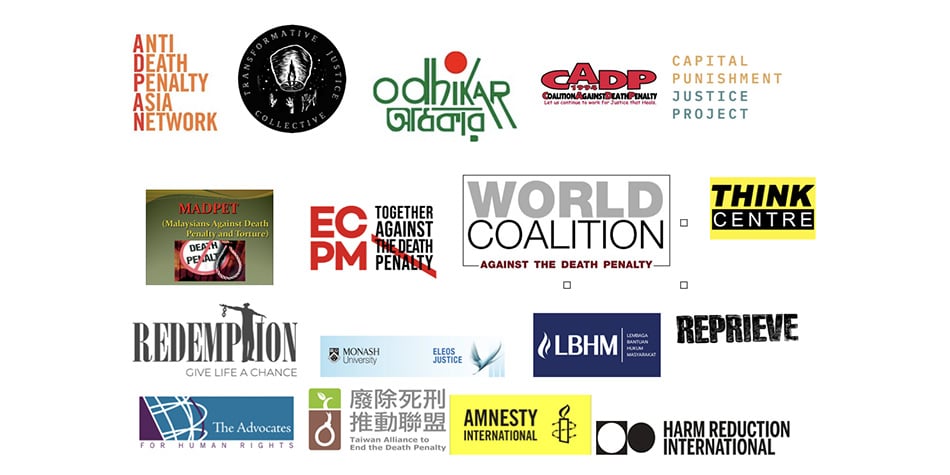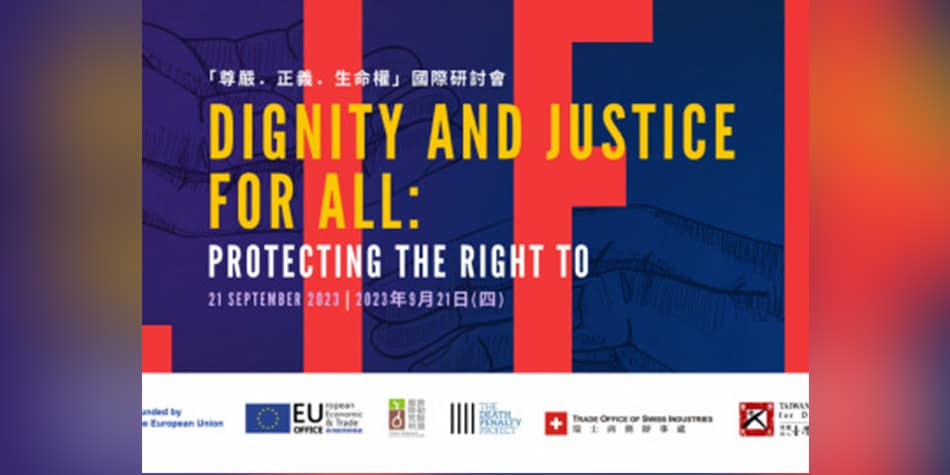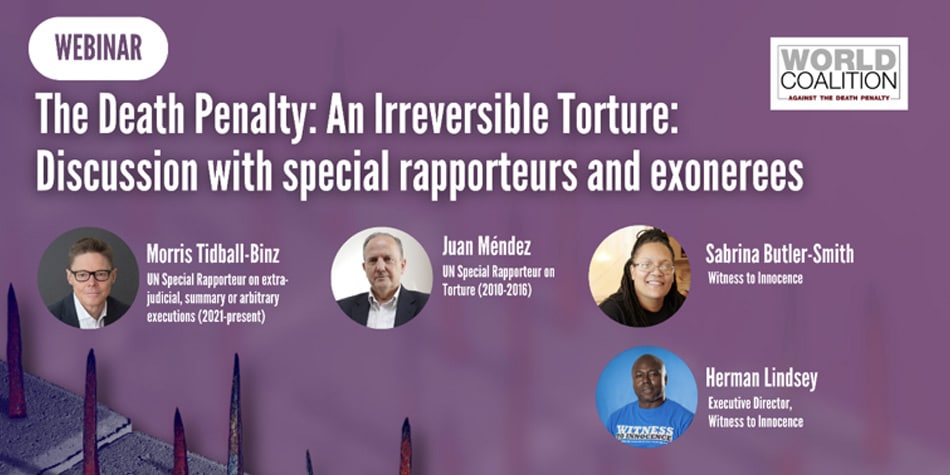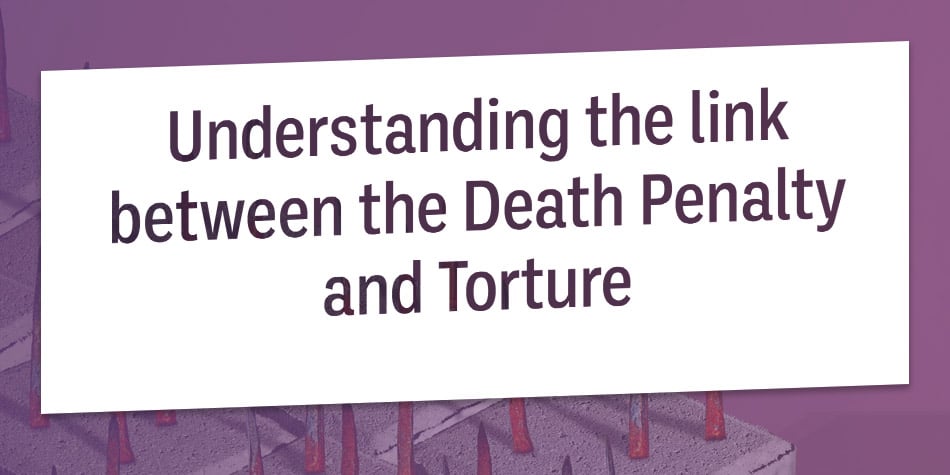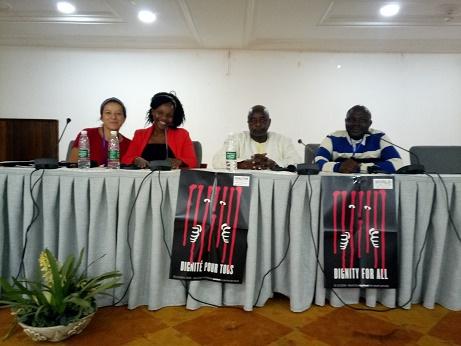
NGO Forum & The ACHPR: A broad overview of African prisons amidst tensions
Africa
Addressing living conditions on death row
In the wake of the World Day against the Death Penalty, living conditions on death row in sub-Saharan Africa was at the heart of discussions during a side event organized by the World Coalition, FIACAT and FIDH.
Members of the panel included Connie Numbi (FHRI, Uganda), Nestor Toko (Rights and Peace, Cameroon) and Jessica Corredor (World Coalition Against the Death Penalty). Moderation was provided by Mabassa Fall, FIDH representative to the African Union. The speakers presented the situation regarding the death penalty in their respective countries, with an emphasis on living conditions on death row.
The FHRI representative explained that "Uganda has 28 offences that carry the death penalty. This is the highest number of offences punishable by the death penalty in the East African region." However, Uganda has not executed any prisoners since 2005 and the death row population has decreased significantly since the Susan Kigula ruling, which resulted in the abolition of the mandatory death penalty.
Despite positive progress and efforts by the Ugandan prison administration, living conditions in Ugandan prisons still do not meet international standards. According to Connie Numbi, "the main problem detainees have to face is waiting. A poor person can wait up to 10 years before a court-appointed lawyer actually accepts his case." In addition to the waiting, there are also issues related to the clearly insufficient hygiene and medical services. Ms Numbi said that "most death row inmates are over 50 years old. They are vulnerable to diseases such as diabetes and high blood pressure. Purchasing drugs is almost impossible and the government can only provide them to a certain extent. There is an inmate who is forced to wear diapers because of his diabetes, and he suffers because the government only provides them from time to time.”
She nonetheless highlighted the government’s efforts in terms of education and rehabilitation activities. Many female prisoners, illiterate before they entered prison, were able to learn how to read and write. Some, such as Susan Kigula or Paul Kakubi, have received scholarships from international organizations to study law.
In Cameroon’s case, Mr. Toko gave the preliminary results of a death row investigation in Cameroon conducted by his organization in partnership with Ensemble contre la peine de mort (ECPM). The picture painted by Maitre Toko of the 5 prisons they investigated is rather grim: hygiene-related problems are numerous and, like those sentenced to death in Uganda, prisoners receive inadequate medical attention.
In addition to frequent problems with many prisons on the African continent, there is also the issue of prisoners convicted of terrorism, particularly in Maroua prison in northern Cameroon. The representative of Rights & Peace reported on the many abuses commited by prison staff, not only against detainees but also their families. "Especially for those sentenced to death for acts of terrorism, their visitors are intimidated and scammed by the Maroua prison staff. And even if visitors have received proper authorization, access to the prison is only granted after prolonged interrogations and systematic frisking. In addition, those sentenced to death for terrorist acts – mostly foreigners – get very few visits. Their families, for fear of being arrested for complicity in terrorism (and therefore suffering the same fate as their loved one) do not go to prison.
Finally, the representative for the World Coalition expressed her concern about the situation of women sentenced to death, due to the many problems faced specifically by women. She then invited participants to read the report on the subject published by the Cornell University Center on the Death Penalty and the World Coalition against the Death Penalty.
The audience then took the floor to ask various questions about the death penalty on the African continent and living conditions in prisons, but also to discuss the situation surrounding the death penalty in their respective countries: Algeria, DRC, Liberia, Kenya, Sudan and Tanzania.
Mr. Mabassa Fall, FIDH representative to the African Union, concluded the session by recalling that the role of civil society is to educate and raise awareness, accompanying governments on the path to abolition. He also stressed the importance of advocating for the adoption of the Protocol to the African Charter on the abolition of the death penalty by the African Union.
Corruption and judicial failures
As in every NGO Forum preceding the ACHPR, the death penalty was discussed during the "Special Interest Groups" discussions, this time through the prism of the fight against corruption. Comprising representatives from Algeria, Togo, Cameroon, Kenya, Uganda, Mauritania and Uganda, the group was to address the impact of corruption on the application of the death penalty and subsequently issue recommendations.
Participants noted the direct impact of corruption on the death penalty, particularly when the judiciary is subservient to the executive branch. Indeed, some political powers can use justice to silence any dissenting voices.
In addition, most people facing the death penalty live in poverty and therefore cannot afford a competent lawyer. As a result, they are sentenced to the death penalty whereas the State should have guaranteed the right to legal representation via legal aid.
Corruption also has a negative impact on prison conditions, particularly when prison budgets are diverted and the State is no longer able to meet its basic obligations, particularly in terms of food and health care.
To this regard, the group made three main recommendations: promoting legislative reforms to bring justice closer to the people, increasing the capacities of judicial actors and civil society in the field of corruption and strengthening the independence of the judicial system.
The 63rd session of the ACHPR in a context of threats to its independence
The 63rd session of the African Commission on Human and Peoples’ Rights took place from 24 October to 2 November. The session took place in amidst tensions between the Commission and civil society organizations due to the recent decision of the African Union to restrict the independence of the ACHPR.
Indeed, in parallel of the 33rd Ordinary Session of the African Union held in Mauritania in June 2018, the Committee of Permanent Representatives of the African Union and the African Commission on Human and Peoples’ Rights participated in a joint meeting where important decisions were taken on the functioning of the ACHPR. As stated in the decision, "the Executive Council emphasizes that the independence of the ACHPR is functional in nature and is not independent of the bodies that created it, while expressing its caution about the tendency of the ACHPR to act as an appellate body, thereby undermining national legal systems". The Executive Council also decided that "the work of the ACHPR should be aligned with […] common African ideals, the institutional reform of the Union and the decisions of its governing bodies, while considering the virtues of the historical tradition and values of African civilization that should inspire and characterize their vision of the concept of human and popular rights.”
The attending civil society organizations met to launch a campaign in support of an independent ACHPR. Following this meeting, the Banjul Declaration was drafted and sent to the ACHPR. The statement is available here.




